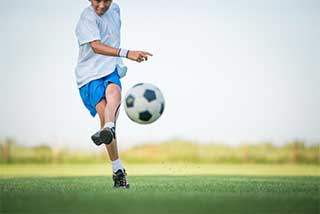 Is your teen an athlete? Whether your child plays soccer, football, baseball, basketball, wrestles, is a cheerleader, or participates in any other sport, they're at risk for a dental injury. Take a look at what parents need to know about sports-related dental injuries in teens, the ways to safeguard their smiles while they pursue their athletic passions, and what to do if your child cracks, damages, or loses a tooth during practice or game play.
Is your teen an athlete? Whether your child plays soccer, football, baseball, basketball, wrestles, is a cheerleader, or participates in any other sport, they're at risk for a dental injury. Take a look at what parents need to know about sports-related dental injuries in teens, the ways to safeguard their smiles while they pursue their athletic passions, and what to do if your child cracks, damages, or loses a tooth during practice or game play.
How Common Are Sports-Related Dental Injuries?
Dental injuries in sports are more common than one might think. These injuries can range from minor chipped teeth to severe trauma that requires extensive dental work. The American Dental Association (ADA) points out that research shows the rate of collision sports-related dentofacial injuries tops 27 percent. Data shows the dental trauma rates for athletes who don't wear mouthguards are between 48.31 and 59.98 percent, while the rates for mouthguard wearers are between 7.5 and 7.75 percent.
What Sports Can Cause Dental Injuries in Teens?
Any sport that has a collision or facial impact risk could cause a dental injury. These include contact sports as well as limited-contact and high-velocity activities that involve no contact.
Sports such as ice skating, skateboarding, and skiing don't involve contact with another player or participant. But the fast or high-velocity nature of the sport increases the risk of an oral injury. Likewise, any sport where a ball might contact the face (such as baseball or softball) also poses a dental injury risk.
According to the ADA, common contact or collision sports that can cause dental injuries include (but aren't limited to) basketball, lacrosse, martial arts, boxing, rugby, football, soccer, water polo, wrestling, hockey, and handball. The ADA also reports that limited-contact sports that may cause facial or dental injuries include acrobatics/gymnastics, skateboarding, bicycling, baseball, skiing, softball, equestrian events, squash, field events, surfing, inline skating, volleyball, and weightlifting.
What Are Common Dental Injuries in Teens?
Tooth fractures are a common sports-related dental injury in teens. A direct impact to the mouth can lead to chipped or fractured teeth. These injuries are not only painful but can also have lasting aesthetic consequences.
Even though cracks and chips are common, these aren't the only dental injuries that your young athlete could face. Dental luxations are oral issues that your teen may need to watch out for. A dental luxation happens when a tooth is displaced from its normal position in the mouth. This can include a tooth that is pushed either backward, forward, or sideways. Prompt dental intervention is crucial to reposition the tooth correctly.
In severe cases, a tooth may be completely knocked out of the socket. This is known as an avulsion. Quick action is essential in trying to save the tooth. In many cases, successful re-implantation is possible if done promptly and correctly.
Do All Sports-Related Oral Injuries Affect the Teeth?
Not all sports-related dental injuries will involve teeth. The soft tissues of the mouth, such as the lips, cheeks, and tongue, are also susceptible to injury during sports activities. Like injuries to a tooth, injuries to the gums or other oral soft tissue will require dental intervention.
This means you may need to bring your child to an emergency dentist after an incident that affects the soft tissue. If there is a deep wound or severe bleeding, seek emergency care from a hospital or similar medical treatment center immediately.
How Can Your Teen Protect Their Mouth?
Mouthguards are a top way to prevent dental injuries in sports. In order for a mouthguard to work, your child must wear it and must choose a properly fitted device. Custom-made mouthguards, provided by a dentist, offer the best protection, but even over-the-counter options can significantly reduce the risk of injury. In sports like football and hockey, helmets with face guards can provide additional protection to the face and mouth.
The National Federation of State High School Associations (NFHS) has a mouthguard mandate for some school athletes. This mandate requires field hockey, football, lacrosse, and some wrestling participants to wear mouthguards. Even if your teen does not play one of these sports, they can benefit from the protection a mouthguard offers.
Along with giving your teen a mouthguard, make sure they are educated on safe sports practices and the risk of oral injuries. Knowledge of the importance protective gear plays and recognizing the signs of an injury can make a substantial difference.
How Can Your Child's Dentist Help?
Routine dental visits are crucial for identifying and addressing any dental issues promptly. Regular check-ups can help catch potential problems before they become serious. The dentist can also help to educate your child on safe sports practice and mouthguard use. If your child needs a custom mouthguard, they can discuss the options during a routine office visit.
What Should Your Teen Do If They Have a Dental Injury?
Again, a severe injury with a deep cut or serious bleeding requires immediate emergency attention. Some of these injuries may require a teen to go to a hospital's emergency department. If the injury is serious but doesn't warrant a trip to the ER, they will need an emergency dental appointment.
Does your child need a dental appointment? Contact Dentistry for Children & Adolescents for more information.